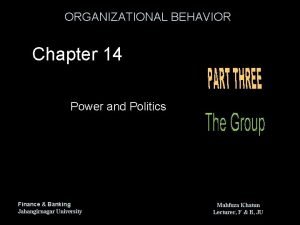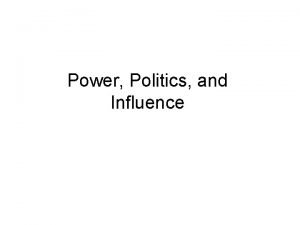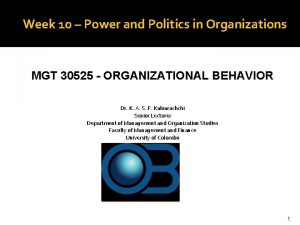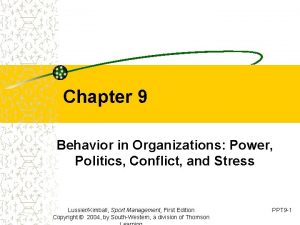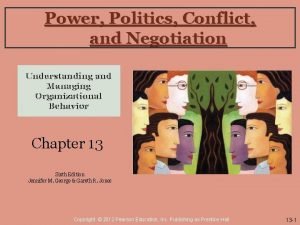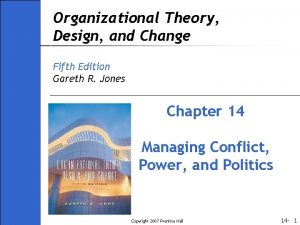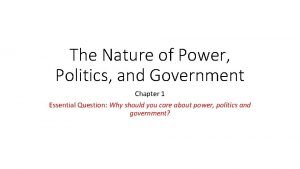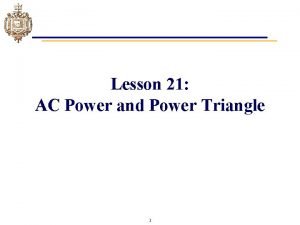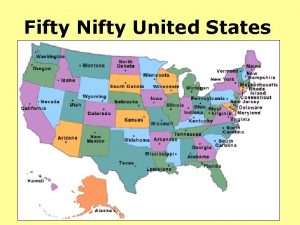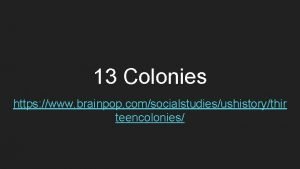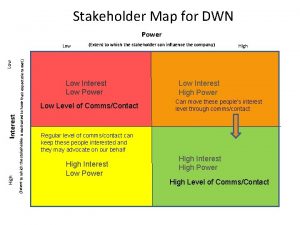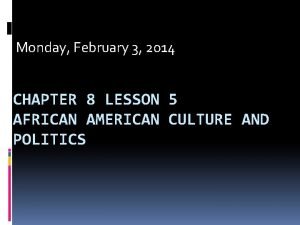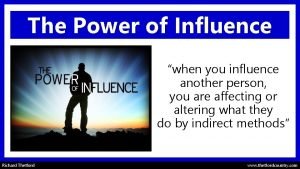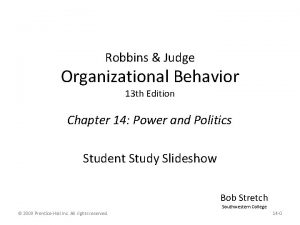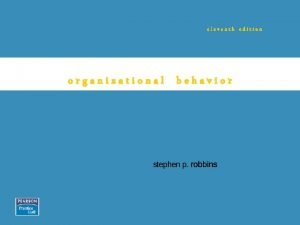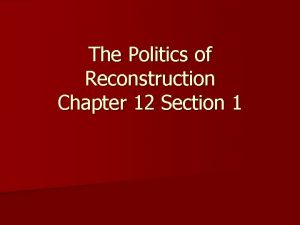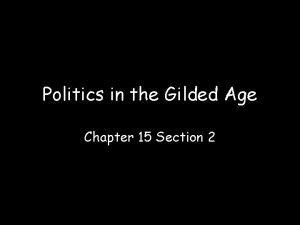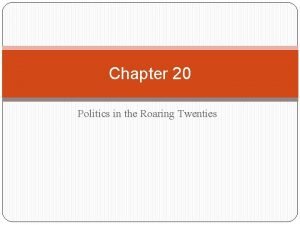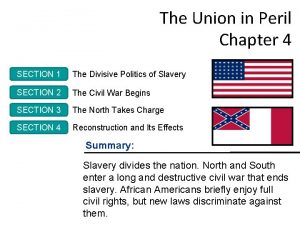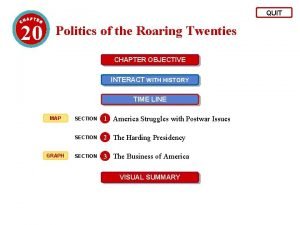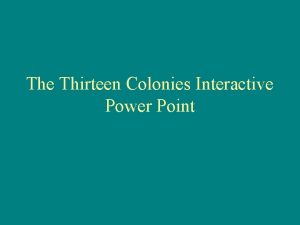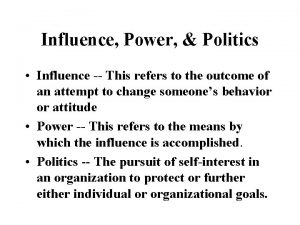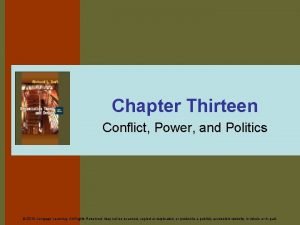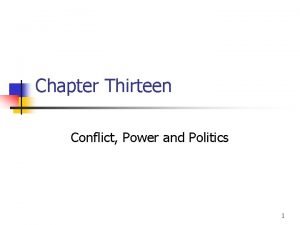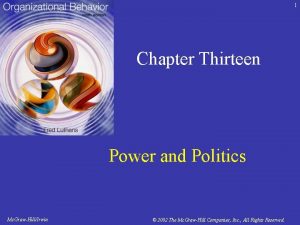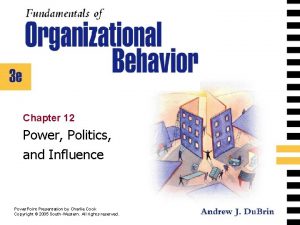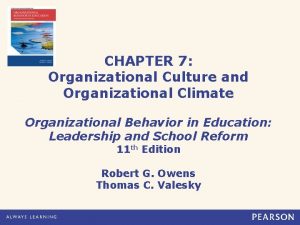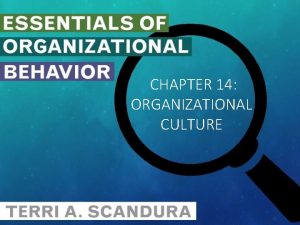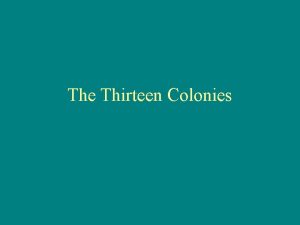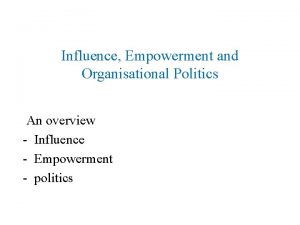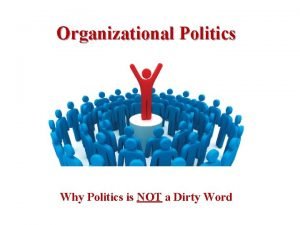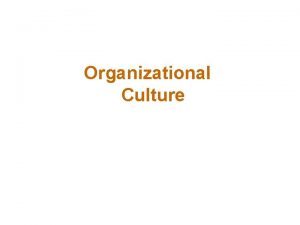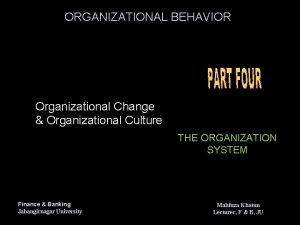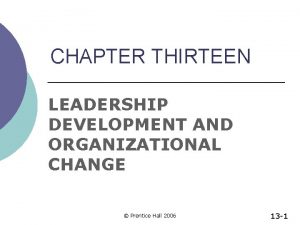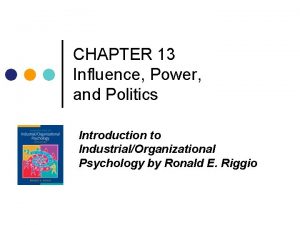Chapter Thirteen Influence Power and Politics An Organizational










































- Slides: 42

Chapter Thirteen Influence, Power, and Politics: An Organizational Survival Kit Mc. Graw-Hill/Irwin Copyright © 2010 The Mc. Graw-Hill Companies, Inc. All rights reserved.

After reading the material in this chapter, you should be able to: • Name five “soft” and four “hard” influence tactics and summarize Cialdini’s principles of influence and persuasion. • Identify and briefly describe French and Raven’s five bases of power. • Define the term empowerment and explain how to make it succeed 13 -2

After reading the material in this chapter, you should be able to: • Define organizational politics and explain what triggers it, and specify the three levels of political action in organizations. • Distinguish between favorable and unfavorable impression management tactics. • Explain how to manage organizational politics. 13 -3

Nine Generic Influence Tactics 1. Rational persuasion 2. Inspirational appeals 3. Consultation 4. Ingratiation 5. Personal appeals 6. 7. 8. 9. Exchange Coalition tactics Pressure Legitimating tactics 13 -4

Question? Tami has a tendency to use praise or flattery with her boss prior to making a request for her expense account approval every month. Tami is using which influence tactic? A. B. C. D. Inspirational appeal Ingratiation Pressure Consultation 13 -5

Three Influence Outcomes 1. Commitment - substantial agreement followed by initiative and persistence in pursuit of common goals 2. Compliance - reluctant agreement requiring subsequent prodding to satisfy minimum requirements 13 -6

Three Influence Outcomes 3. Resistance - stalling, unproductive arguing, or outright rejection 13 -7

Practical Research Insights • Commitment is more likely when people rely on strong rational persuasion and do not rely on pressure and coalition tactics • Ingratiation can slightly improve your performance appraisal results 13 -8

Practical Research Insights • Commitment is more likely when the influence attempt involves something important and enjoyable • Credible people tend to be the most persuasive • Employees are more apt to accept change when managers rely on a consultative strategy 13 -9

How to Do a Better Job of Influencing and Persuading Others 1. Liking - people tend to like those who like them 2. Reciprocity - belief that both good and bad deeds should be repaid in kind is virtually universal 3. Social proof - people tend to follow the lead of those most like themselves 13 -10

How to Do a Better Job of Influencing and Persuading Others 4. Consistency - people tend to do what they are personally committed to 5. Authority - people tend to defer to and respect credible experts 6. Scarcity - people want items, information, and opportunities that have limited availability 13 -11

Social Power • Social power - ability to marshal the human, informational, and material resources to get something done 13 -12

Five Bases of Power • Reward power - obtaining compliance with promised or actual rewards. • Coercive power - obtaining compliance through threatened or actual punishment. • Legitimate power - obtaining compliance through formal authority. 13 -13

Question? As a Division Head, Natalie is implementing pay-for-performance plans and positive reinforcement programs at Goodwill Wireless Center. Natalie is attempting to exploit which power? A. B. C. D. Coercive Expert Referent Reward 13 -14

Five Bases of Power • Expert power - obtaining compliance through one’s knowledge or information. • Referent power - obtaining compliance through charisma or personal attraction. Read an article on organizational power 13 -15

Practical Lessons from Research • Expert and referent power had a generally positive effect • Reward and legitimate power had a slightly positive effect • Coercive power had a slightly negative effect 13 -16

Employee Empowerment • Empowerment - sharing varying degrees of power with lowerlevel employees to tap their full potential 13 -17

The Evolution of Power Figure 13. 1 13 -18

Participative Management • Participative management - process whereby employees play a direct role in setting goals, making decisions, solving problems, and making changes in the organization 13 -19

Participative Management • Participative management helps employees fulfill three basic needs: - Autonomy - Meaningfulness of work - Interpersonal contact 13 -20

Question? Herman is able to work more on his own now that his supervisor has given him more responsibility and authority in his job. Which need of participative management does this fulfill? A. B. C. D. Autonomy Meaningfulness of work Interpersonal contact Sovereignty 13 -21

Domain of Organizational Politics • Organizational politics - intentional acts of influence to enhance or protect the self-interests of individuals or groups 13 -22

Sources of Uncertainty 1. 2. 3. 4. 5. Unclear objectives Vague performance measures Ill-defined decision processes Strong individual or group competition Any type of change 13 -23

Levels of Political Action in Organizations Figure 13 -24

Levels of Political Action • Coalition - temporary groupings of people who actively pursue a single issue 13 -25

Frequently Used Political Tactics 1. 2. 3. 4. 5. Building a network of useful contacts Using ‘key players’ to support initiatives Making friends with power brokers Bending the rules to fit the situation Self-promotion 13 -26

Frequently Used Political Tactics 6. 7. 8. 9. Creating a favorable image Praising others (ingratiation) Attacking or blaming others Using information as a political tool 13 -27

Question? Whenever things don’t go well for Duane, he is quick to shift fault to others. Which political tactic is he using? A. B. C. D. Creating a favorable image Praising others (ingratiation) Attacking or blaming others Using information as a political tool 13 -28

Impression Management • Impression management - process by which people attempt to control or manipulate the reactions of others to images of themselves or their ideas 13 -29

Favorable Impression Management • Job-focused - manipulating information about one’s performance • Supervisor-focused - praising and doing favors for one’s supervisor • Self-focused - presenting oneself as a polite and nice person 13 -30

Question? Kendall will often do favors and run errands for her manager. She is engaged in _____ impression management. A. Job-focused B. Supervisor-focused C. Self-focused D. Organization-focused 13 -31

Bad Impressions Four motives for intentionally looking bad at work: • Avoidance • Obtain concrete rewards • Exit • Power 13 -32

Unfavorable Upward Impression Management Tactics • Decreasing performance • Not working to potential • Withdrawing • Displaying a bad attitude • Broadcasting limitations 13 -33

How to Keep Organizational Politics within Reasonable Bounds • Screen out overly political individuals at hiring time. • Create an open-book management system. • Make sure every employee knows how the business works and has a personal line of sight to key results • Have non-financial people interpret periodic financial and accounting statements for all employees. 13 -34

How to Keep Organizational Politics within Reasonable Bounds • Establish formal conflict resolution and grievance processes. • As an ethics filter, do only what you feel comfortable doing on national television. • Publicly recognize and reward people who get real results without political games. 13 -35

Supplemental Slides • Slides 37 -42 contain extra non-text examples to integrate and enhance instructor lectures - Slide 37 -38: Principles of Influence Slide 39: Impression Management Tips Slide 40: Building Empowerment Through Ownership Slide 41 -42: Video discussion slides 13 -36

Principles of Influence • Liking: The more we like the other person, the more likely we’ll comply with their requests • Reciprocity: The belief that both good and bad deeds should be repaid in kind. • Social Proof: Role models and peer pressure are powerful forces Source: R. B. Cialdini, "Harnessing the Science of Persuasion, " Harvard Business Review, October 2001, pp. 72 -79. 13 -37

Principles of Influence • Consistency: Once individuals have stated a commitment they tend to act in accordance with that commitment. • Authority: People tend to defer to and respect credible experts. • Scarcity: Requests that emphasize scarcity or the fact that some object, opportunity, or outcome will soon no longer be available, are difficult to resist. Source: R. B. Cialdini, "Harnessing the Science of Persuasion, " Harvard Business Review, October 2001, pp. 72 -79. 13 -38

Impression Management Tips • • Tone down the star quality Don’t be Mr. Personality Get the inside scoop Give ‘em something to talk about Source: Allow Me to Introduce Myself (Properly), Sam Grobart, Money January 2007 13 -39

Building Empowerment Through Ownership • Believe in what you propose • Communicate the meaning of ownership • Share profit-and-loss information • Make it worthwhile financially • Turn your owners into decision makers 13 -40

Video Case: Dealing with Office Bullies • Can workplace bullying lead to conflict between managers and subordinates? • Why is bullying a concern to organizations? What are some of the adverse affects of bullying in the workplace? • How can office bullying be managed? Is there legal recourse for victims of bullying? 13 -41

Video: Officials Investigate CEOs in Stock Option Scams • Jacob Alexander is being charged with securities fraud. Is this fair given how common backdating stock options seems to be? • How does a stock option work as an incentive for employees? • Would you be upset if you learned that a company you owned stock in backdated stock options? Why or why not? • How would you deal with being offered lucrative stock options if you learned that they had been 13 -42 backdated?
 Preferred power tactics by influence direction
Preferred power tactics by influence direction Factors contributing to organizational politics
Factors contributing to organizational politics Factors contributing to organizational politics
Factors contributing to organizational politics Power and politics in organizations
Power and politics in organizations Power, politics and conflict in organizations
Power, politics and conflict in organizations Power, politics and conflict in organizations
Power, politics and conflict in organizations Power and politics organization theory
Power and politics organization theory Power and politics
Power and politics The nature of power politics and government
The nature of power politics and government Comparing colonial regions chart
Comparing colonial regions chart Power definition
Power definition Organizational characteristics that influence training
Organizational characteristics that influence training Power triangle
Power triangle 13 colonies
13 colonies One two three four five six numbers
One two three four five six numbers Thirteen ways of seeing nature in la summary
Thirteen ways of seeing nature in la summary Sdbsweb
Sdbsweb Freddy the thirteen
Freddy the thirteen 13 colonies quizlet
13 colonies quizlet How many dogs can you see answer
How many dogs can you see answer Alabama alaska arizona arkansas
Alabama alaska arizona arkansas Brainpop regions of the 13 colonies
Brainpop regions of the 13 colonies Thirteen apostles
Thirteen apostles Our vicar is always raising money for one cause or another
Our vicar is always raising money for one cause or another Power and influence mapping
Power and influence mapping Power and influence mapping
Power and influence mapping Power and influence mapping
Power and influence mapping Stakeholder register
Stakeholder register Power and influence in the workplace
Power and influence in the workplace Lesson 5 african american culture and politics
Lesson 5 african american culture and politics Chapter 31 the politics of boom and bust
Chapter 31 the politics of boom and bust Sin redemption and damnation in dr faustus
Sin redemption and damnation in dr faustus Power of influence
Power of influence Preferred power tactics by influence direction
Preferred power tactics by influence direction General dependency postulate
General dependency postulate The politics of reconstruction chapter 12 section 1
The politics of reconstruction chapter 12 section 1 Pendleton civil service act
Pendleton civil service act Chapter 20 section 2 the harding presidency
Chapter 20 section 2 the harding presidency Chapter 12 reconstruction and its effects
Chapter 12 reconstruction and its effects Chapter 4 section 1 the divisive politics of slavery
Chapter 4 section 1 the divisive politics of slavery Chapter 7 section 3 politics in the gilded age
Chapter 7 section 3 politics in the gilded age Chapter 12 politics of the roaring twenties
Chapter 12 politics of the roaring twenties Chapter 20 politics of the roaring twenties answer key
Chapter 20 politics of the roaring twenties answer key
